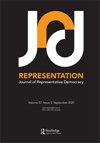The Trade-Off between Equal Representation and Electoral Participation: The Effect of Redistricting on Voter Turnout
Q2 Social Sciences
引用次数: 0
Abstract
ABSTRACT Equal representation and electoral participation lie at the core of democracy. However, the two are sometimes contradictory. When redistricting is used to correct malapportionment, a typical example of unequal representation, it can discourage citizens from voting by increasing their anxiety about whether their interests are represented and increasing their information cost. The effect of redistricting on electoral participation has not been accurately estimated due to difficulty isolating the effect from past redistricting and other factors. Japan’s upper house conducted its first redistricting in 2016, providing an ideal opportunity to identify and isolate the effect of redistricting on electoral participation by avoiding the usual methodological problems. Using an original dataset on Japan’s upper house elections from 2001 to 2019 and employing a differences-in-differences design, this study reveals that redistricting reduced voter turnout by 10.3 percentage points and that the effect lasted until the second election after redistricting.平等代表权与选举参与的权衡:选区重划对投票率的影响
平等代表权和选举参与是民主的核心。然而,两者有时是矛盾的。当重新划分选区被用来纠正比例失调(代表性不平等的典型例子)时,它会增加公民对自己的利益是否得到代表的焦虑,并增加他们的信息成本,从而阻止他们投票。由于难以将重新划分选区的影响与过去的重新划分选区和其他因素隔离开来,因此尚未准确估计重新划分选区对选举参与的影响。日本上院于2016年首次重新划分选区,通过避免通常的方法问题,提供了一个理想的机会来识别和隔离重新划分选区对选举参与的影响。使用2001年至2019年日本上院选举的原始数据集,并采用差异设计,本研究表明,重新划分选区将选民投票率降低了10.3个百分点,这种影响一直持续到重新划分选区后的第二次选举。
本文章由计算机程序翻译,如有差异,请以英文原文为准。
求助全文
约1分钟内获得全文
求助全文
来源期刊

Representation
Social Sciences-Sociology and Political Science
CiteScore
3.50
自引率
0.00%
发文量
31
期刊介绍:
This change in scope follows two paths. Firstly, it seeks contributors who are interested in exploring the interface between democratic practice and theory. In particular, this focus seeks contributions that apply theoretical insights to actual examples of current practice. Secondly, while not neglecting the current focus of the journal, we would like to expand its international coverage so that the journal will offer our readers insights in the state of democracy worldwide.
 求助内容:
求助内容: 应助结果提醒方式:
应助结果提醒方式:


